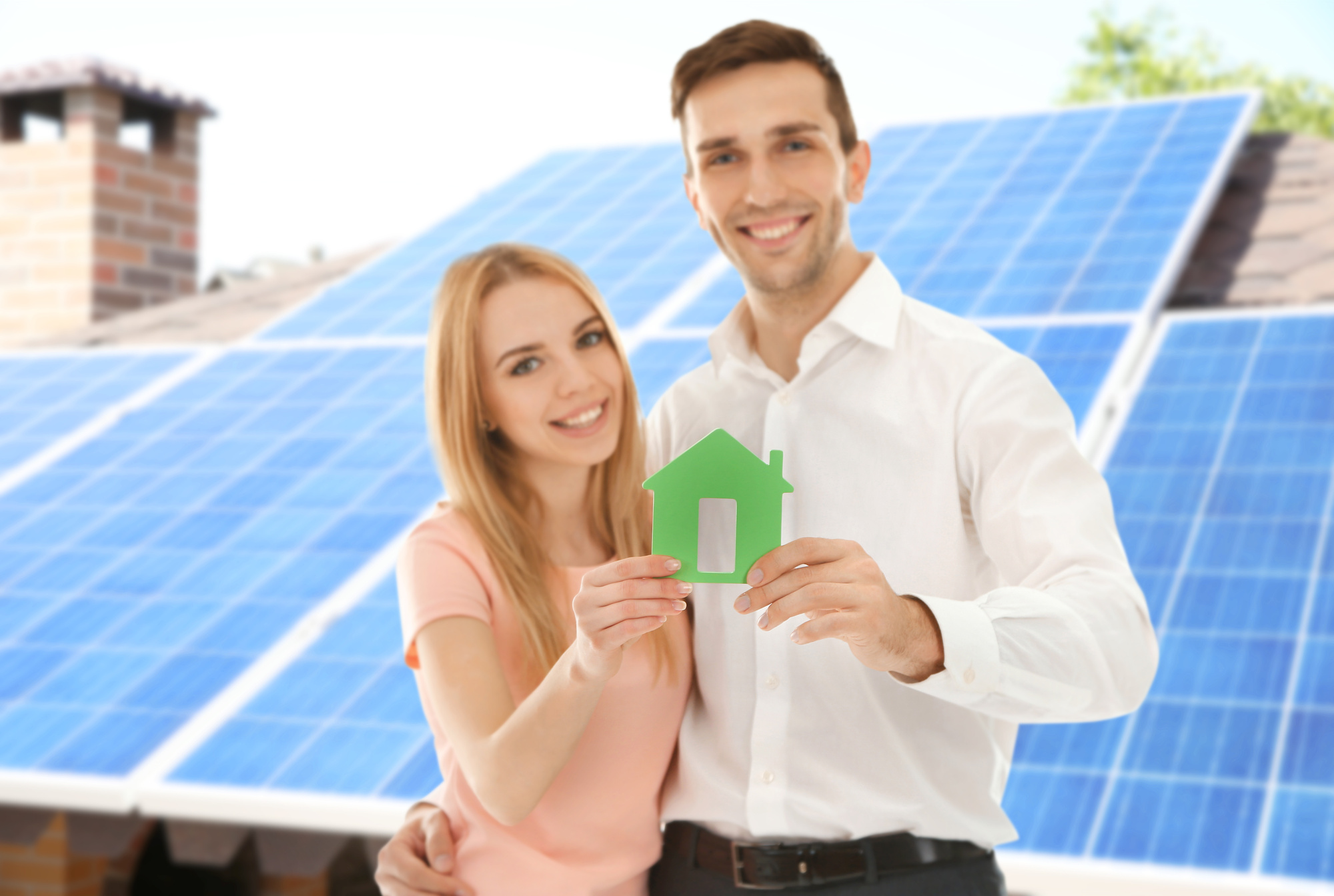
Young couple holding figure of house and solar panels on background
What if I told you you could make your house run on its energy? Solar panels make it possible. Once they’re set up, they’ll power your whole home, so you won’t have to pay for utilities.
But it’s not all sunshine and roses when you get solar panels put in. Things can go wrong if you’re not careful, and buying solar panels to install on your house is not cheap.
There are a few things you should think about before you decide to buy solar panels. Read on to learn about these energy makers you might not know.
1. Energy Needs
Buying solar panels starts by knowing how much energy you need. This will help you figure out how big of a solar panel system you need to meet your power needs. This helps the system work as well as possible and makes sure it makes enough energy to cover your needs.
If a solar panel setup is too big or too small, it won’t work as well as it could. If the system is too small, it might not make enough energy, leaving you dependent on the grid. On the other hand, a system that is too big may produce more energy than you need, which wastes resources and drives up costs.
When you know how much energy you need, you can figure out how much money the solar panel system could make you. You can figure out how long it will take for the system to pay for itself and start saving you money by comparing the energy savings over time to the upfront costs.
2. Roof Suitability
How well solar panels work depends on how much energy they get. When you evaluate your roof’s usefulness, you can find out if it gets enough sunlight during the day, especially during peak solar hours. Most of the time, it’s best to have a roof that faces south and has little shade.
It is essential to look at the space on the roof to see if it can hold the right amount of solar panels. When you have more room, you can build a bigger system, producing more energy. Things that might get in the way, like pipes, vents, or skylights, should also be considered.
Before you put solar panels on your roof, you should also check the roof’s stability. Solar panels are big, so the roof must be strong enough to hold them. Check with a professional to ensure your roof is in good shape and can handle the extra weight.
3. Energy Efficiency
Appliances that are energy-efficient are made to use less power while still doing their job. By getting new appliances that use less energy, you can cut your general energy use by a lot. This will make your home more energy-efficient even before you get solar panels.
Before buying solar panels, it’s a good idea to look at your current tools and determine which ones are old or don’t work well. Look for machines that have ENERGY STAR ratings or other certifications that prove they use energy efficiently.
Before you go solar, make sure you have energy-efficient appliances. This will help you build a more sustainable and cost-effective energy system for your house.
4. Financial Feasibility
Solar panel systems cost money upfront to buy the equipment, have it installed, and get any necessary permits or checks. By figuring out how much money you have, you can see if you can shop for solar panels.
Knowing your financial situation also lets you figure out if installing solar panels will give you a good return on your money. By looking at the starting costs and figuring out how much money you will save on energy over time, you can figure out how long it will take to get your money back and start making net savings.
By looking at your finances, you can figure out how much energy you could save by installing solar panels. By comparing your current energy bills to the expected savings from solar energy production, you can figure out how much money you can save over the solar panel system’s lifetime.
5. Incentives and Rebates
Installing solar panels can be much cheaper upfront if you qualify for incentives and tax refunds. Federal, state, or local governments often offer these cash incentives to encourage people to use renewable energy. By taking advantage of these benefits, you can reduce the amount you have to spend on your solar panel system.
Tax breaks and incentives can help you get a better return on your investment in a solar panel setup. By lowering the initial cost, you may be able to shorten the time it takes to get your money back. This means you can start getting the financial benefits of solar energy sooner.
6. Solar Panel Type
Different kinds of solar panels have different amounts of how well they turn sunlight into electricity. When you know how efficient each type of solar panel technology is, you can choose panels that make the most energy and improve the performance of your system.
Costs vary by type of solar cell. By learning about the different types of panel technologies, like monocrystalline, polycrystalline, and thin-film, you can figure out which ones are the most cost effective for your budget and energy needs.
Different types of solar panels may need to be compatible with other parts of the system, like inverters or mounting systems. Knowing about compatibility helps ensure your solar panel system works well and fits together.
7. Warranty and Maintenance
To protect your investment, it’s essential to understand the guarantee that comes with your solar panels. A full warranty gives you options if there are any problems with the product’s quality or performance during the time of the guarantee.
Some warranties come with a performance promise that says the panels will keep working at a certain level for a while. This promise gives you peace of mind that the panels will keep making electricity at their best level, so you can count on them to keep making energy.
Also to the manufacturer’s guarantee, you should also think about the installer’s warranty or service agreement. A trustworthy installer should offer their own warranty on the job they did to ensure any problems are resolved.
8. Installation and Service Providers
Installing solar panels takes technical skills and information. Choosing an installer with a good reputation and a lot of experience will ensure that the panels are set up, improving their performance and making them last longer. Proper fitting also makes sure that you follow local rules and safety standards.
How well your solar panel system works depends on how well the person who installs it does their job. A skilled installer will look at your roof’s orientation, how much shade it gets, and your electrical needs to create and install a system that makes the most energy possible.
9. Local Regulations and Permits
Solar panels can be installed in your area if you follow the rules and get the proper licenses. Knowing and following these rules makes your solar panel installation legal and in line with local building codes and guidelines.
Getting a permit to install solar panels can differ based on your location. Knowing the rules and regulations in your area makes it easier to get a pass and helps you avoid any delays or problems that could come up.
10. Solar Panel Efficiency
How well solar panels work directly affects how much power they can make. More of the sun’s energy gets turned into usable electricity by panels with better efficiencies, giving your system more energy. If you choose more efficient panels, you can make more power and cover a bigger part of your energy needs.
If you only have a small roof or a specific spot to put solar panels, higher-efficiency panels can make more electricity in a smaller place. This is especially helpful if you want to get the most energy out of the area you have.
11. Environmental Impact
Solar panels use the sun’s energy to make electricity, so they are a clean and renewable energy source. By installing solar panels, you help reduce the use of fossil fuels and the carbon pollution that comes with them. This helps slow down climate change.
Solar energy is a source of low-carbon electricity. Unlike the traditional way of making electricity with fossil fuels, using solar panels to produce electricity creates little to no greenhouse gas emissions. You do your part using solar energy to reduce carbon dioxide and other harmful emissions that add to global warming.
Consider These Factors Before Buying Solar Panels
Solar panels are a wise investment – money and energy-saving – for the right owner. Before buying solar panels, take time to consider these eleven factors.
With a thorough knowledge base, your solar panel purchase can be a valuable financial asset. Research your options to find the best solar panel setup for you and get started on an eco-friendly energy future today!
Did you find this article helpful? Keep reading our blog for more!


